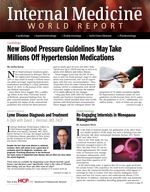Re-Engaging Internists in Menopause Management
In the field of women's health, the publication of the 2002 Women's Health Initiative (WHI) study was such a defining event that clinicians talk about menopausal hormone therapy "before WHI" and "after WHI."

In the field of women’s health, the publication of the 2002 Women’s Health Initiative (WHI) study was such a defining event that clinicians talk about menopausal hormone therapy (HT) “before WHI” and “after WHI.”
Prior to the WHI study, HT was a common treatment option, so internists managed women’s HT often. But after WHI, HT use declined approximately 80% worldwide, so internists now manage menopause infrequently, while obstetricians/gynecologists write more than three-quarters of HT prescriptions.
In the intervening years, it appears that HT is once again preferred for certain women who experience the most severe menopausal symptoms, since the treatment’s benefits for symptomatic relief appear to outweigh its risks in women who have recently undergone menopause and have few breast cancer and cardiovascular disease (CVD) risk factors. In addition, clinicians can prescribe some non-hormonal agents for vasomotor instability, including gabapentin and selective serotonin reuptake inhibitors (SSRIs), as well as selective estrogen receptor modulators (SERMs) for osteoporosis and bone fracture prevention.
In a persuasive commentary that appeared in the April issue of the Journal of Women’s Health, a team of international researchers called for internists to re-engage in menopause management. According to the authors, the factors that influence internists’ decision-making process for menopause management are similar to the factors they face in other diseases, which are complex, multisystem, and complicated by comorbid conditions or elevated risk for disease.
Due to the shift away from menopause management, many internists currently lack the core competencies that are necessary to address menopausal issues and meet women’s change-of-life needs. The authors said rebuilding those competencies — which would include knowledge of the pathophysiology, symptoms, and clinical signs of menopause, as well as an ability to perform pelvic and breast exams — is critical, given that internists who are experienced in menopause management can help reduce healthcare fragmentation for the 50 million women entering menopause before 2020.
The researchers recommended that internists evaluate the risks of HT and non-hormonal agents for individual patients using established tools and methodology. Following risk assessment, internists can conduct appropriate physical exams and engage in shared decision-making with patients.
The authors referred interested readers to the North American Menopause Society (NAMS)’s educational materials for more information.
